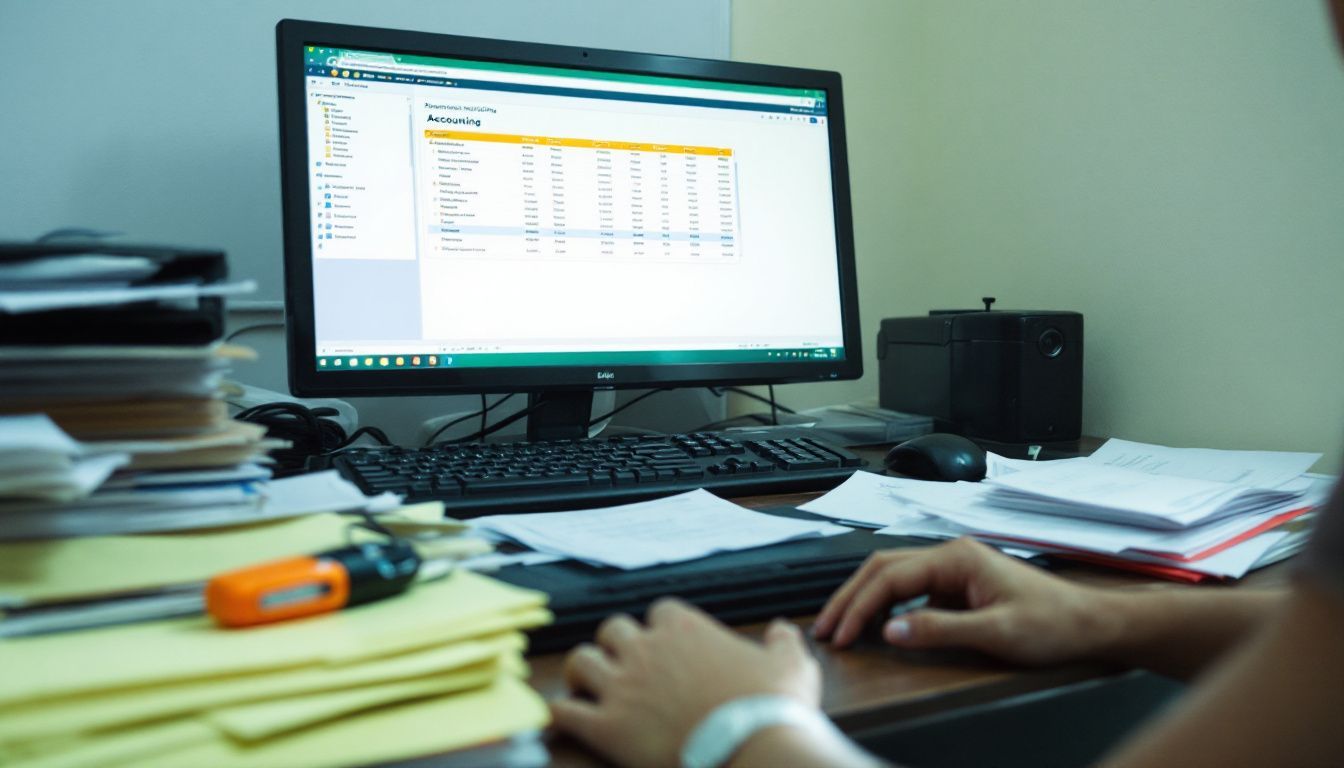Finding the right accounting system for your Philippine business can be tough. Many firms struggle with tracking finances and staying tax-compliant. Accounting System Philippines offers tools to solve these issues.
This post will show you the best options for your needs. Ready to simplify your accounting?
Key Takeaways for Top Accounting Systems for Philippines
- Top accounting systems for Philippine businesses include AutoCount, QuickBooks Online, Xero, Sage 50, ABSS (MYOB), JuanTax, and Sprout Solutions.
- Key features to look for are real-time reporting, multi-currency support, cloud access, automated bank feeds, invoicing tools, and tax compliance.
- BIR-ready software helps companies follow tax rules and file on time.
- Industry-specific solutions exist for retail, manufacturing, healthcare, and other sectors.
- Mobile and cloud-based options let users manage finances from anywhere and keep data safe.
AutoCount Accounting System Philippines

Moving from the basics, let’s explore a top accounting system for Philippine businesses. AutoCount Accounting stands out for small and medium enterprises (SMEs) in the Philippines.
It’s popular in Visayas and Mindanao regions.
AutoCount mixes accounting and point-of-sale (POS) tasks in one system. This helps SMEs manage money better. The software gives real-time reports on finances and tracks inventory. Its easy-to-use design makes it simple for business owners to handle.
PhilVirtualOffice (PVO) sells AutoCount and helps users get the most from it. They teach SMEs how to use the software to follow rules and improve money tasks.
QuickBooks Online
QuickBooks Online is a popular cloud-based accounting system for Philippine businesses. It offers easy-to-use tools for tracking income, expenses, and taxes. Users can access their financial data from any device with internet.
The software also allows real-time collaboration with accountants and team members.
QuickBooks Online simplifies accounting tasks, giving business owners more time to focus on growth.
This accounting software integrates with many third-party apps, making it versatile for different business needs. It provides features like invoicing, bill payments, and financial reporting.
QuickBooks Online also offers multi-currency support, which is helpful for businesses dealing with foreign transactions. The system is regularly updated to comply with Philippine tax laws and regulations.
Xero Accounting Software
Xero Accounting Software offers cloud-based tools for Philippine businesses. It helps track cash flow, create invoices, and manage payroll. Users can access their accounts from any device with internet.
Xero links to over 1,000 apps, making it easy to add features as needed.
Xero stands out with its user-friendly design and strong security. It uses bank-level encryption to keep data safe. The software also allows real-time collaboration between business owners and their accountants.
This can save time and reduce errors in financial records.
Sage 50 Accounting
Sage 50 Accounting stands out as a top choice for Philippine businesses. It offers powerful tools for financial management and reporting. Users can track income, expenses, and cash flow easily.
The software also helps with tax compliance, a key concern for local firms. Sage 50 supports multi-currency transactions, which is great for companies dealing with foreign clients or suppliers.
This system boasts strong security features to protect sensitive financial data. It allows for custom user access levels, keeping information safe. Sage 50 integrates well with other business tools, streamlining operations.
Its cloud-based option lets owners check their finances from anywhere, anytime. For growing businesses, Sage 50 scales nicely, adapting to changing needs without hassle.
ABSS (MYOB) Accounting Software
Moving from Sage 50, we find ABSS (MYOB) Accounting Software. This system offers strong features for Philippine businesses. ABSS stands out with its multi-currency support, perfect for firms dealing with global trades.
It also has solid inventory management tools, helping track stock levels and costs easily.
ABSS shines in financial reporting too. Users can make custom reports that fit their needs. The software is BIR-compliant, making tax time less stressful. It also works well with other business tools, letting companies streamline their processes.
For small to medium firms in the Philippines, ABSS proves to be a smart choice for managing finances and growth.
JuanTax
JuanTax is a tax filing software made for Philippine businesses. It helps companies file their taxes online. The software works with many accounting systems. This makes it easy for firms to send tax reports to the Bureau of Internal Revenue (BIR).
JuanTax also keeps up with the latest tax rules in the Philippines.
Users like JuanTax because it’s simple to use. The software can handle different types of taxes. These include income tax, value-added tax, and withholding tax. JuanTax also offers support to help businesses with tax issues.
This makes it a good choice for small firms and big companies alike.
Sprout Solutions
Sprout Solutions offers a complete HR and payroll system for Philippine businesses. It handles tasks like timekeeping, leave management, and payroll processing. The software also helps with BIR and SSS compliance.
Many companies use Sprout to save time on HR work. It has features for both small and large firms.
Sprout’s cloud-based platform lets users access data from anywhere. This helps remote teams stay connected. The system can grow with a business, adding more tools as needed. Sprout also provides local support, which is helpful for Philippine companies.
Key Features of Top Accounting Systems
Moving from Sprout Solutions, let’s explore the key features of top accounting systems. These features help businesses manage finances better and make smart money choices. Here’s what to look for:
- Real-time financial reporting: Get up-to-date info on your money at any time.
- Multi-currency support: Handle different money types for global business.
- Cloud-based access: Use your accounts from anywhere with internet.
- Automated bank feeds: Link your bank accounts for easy updates.
- Invoicing tools: Make and send bills fast and track payments.
- Expense tracking: Keep tabs on where your money goes.
- Inventory management: Watch your stock levels and costs.
- Tax compliance: Stay in line with BIR rules and file taxes right.
- User-friendly interface: Easy to use, even for non-accountants.
- Mobile app: Check your finances on the go with your phone.
- Data security: Keep your money info safe with strong protection.
- Integration options: Connect with other business tools you use.
- Customizable reports: Make financial reports that fit your needs.
Benefits of Using Accounting Software
Accounting software helps businesses save time and money. It cuts down on errors and speeds up financial tasks. With real-time data, owners can make smart choices fast. The software also makes it easy to track cash flow and manage inventory.
These tools boost team work and make reports quick. They keep data safe and follow tax rules. Many systems link with other business tools, making work smoother. Cloud-based options let users access info from anywhere, anytime.
This helps firms stay flexible and grow.
Supplementary insights on Accounting Systems
Accounting systems offer more than basic bookkeeping. They provide insights into business health and growth opportunities.
Choosing the Right Accounting System
Picking the best accounting system for your business is key. Look at what your company needs. Think about how big your team is and what you sell. Some systems work better for small shops, while others fit big firms.
Check if the software can grow with your business. Make sure it follows Philippine tax rules.
Cost matters too. Compare prices and features of different systems. See if they offer free trials. This lets you test the software before buying. Ask other business owners what they use.
Their tips can help you choose. Pick a system that’s easy to use and gives good support.
Integration Capabilities with Other Tools
AutoCount Accounting links accounting and POS systems for Philippine SMEs. This combo lets businesses track sales and finances in one place. Real-time reports and stock control help owners make smart choices fast.
PhilVirtualOffice offers custom support to fit AutoCount with a company’s current tools. They give info to show how AutoCount can help businesses grow. Their website has a special page just for AutoCount services.
Next, let’s look at BIR-Ready Accounting Software.
Security Features to Look For
Accounting software must protect your financial data. Strong security features are vital for any system you choose.
- Data encryption: Your software should use top-level encryption to keep data safe.
- User access controls: Set different levels of access for each team member.
- Two-factor authentication: Add an extra layer of security to login processes.
- Audit trails: Track all changes made to your financial records.
- Regular backups: Ensure your data is backed up often to prevent loss.
- Secure cloud storage: Look for systems that use trusted cloud providers.
- Compliance with standards: Choose software that meets industry security rules.
- Firewalls: Protect your system from outside threats with strong firewalls.
- Virus protection: Keep your data safe from malware and other harmful programs.
- Password policies: Enforce strong password rules for all users.
BIR-Ready Accounting Software
BIR-ready accounting software helps Philippine businesses follow tax rules. These tools make it easy to create reports the Bureau of Internal Revenue needs. They track sales, expenses, and other money matters.
The software also helps with filing taxes on time.
Many options exist for BIR-compliant accounting in the Philippines. AutoCount Accounting is one choice that works well for small and medium businesses. It offers real-time financial reports and inventory tracking.
PhilVirtualOffice sells and supports AutoCount. They help companies set up the software and use it to meet BIR rules.
Industry-Specific Solutions
BIR-ready software meets tax rules. Industry-specific solutions take it further. Here’s how:
- Retail: POS systems link sales to accounting. They track inventory and customer data.
- Manufacturing: Cost tracking tools manage raw materials and labor. They help set prices.
- Healthcare: Billing systems handle insurance claims. They also manage patient records.
- Construction: Project costing features track job expenses. They help with bids and budgets.
- Hospitality: Reservation systems connect to accounting. They manage room rates and occupancy.
- E-commerce: Online payment gateways integrate with books. They sync sales and inventory.
- Agriculture: Crop planning tools link to financials. They track yields and input costs.
- Real Estate: Property management features handle leases. They track rent and expenses.
- Non-profit: Fund accounting tools manage grants. They create donor reports.
- Professional Services: Time tracking links to billing. It helps with client invoicing.
Small Business Accounting Needs
Small businesses need simple accounting tools. They want easy ways to track money, pay bills, and make reports. AutoCount Accounting fits these needs well. It helps small companies manage sales and inventory in one place.
The software gives real-time financial updates, which is great for quick decisions.
PVO, an AutoCount dealer, offers extra help to small firms. They teach owners how to use the software best. This support helps businesses follow tax rules and manage money better. PVO also shares tips on using AutoCount’s features to save time and boost profits.
Mobile and Cloud-Based Solutions
Mobile and cloud-based accounting solutions offer great benefits for Philippine businesses. These tools let you manage finances from anywhere, at any time. You can access your accounts on smartphones, tablets, or laptops with internet.
This means you can check balances, send invoices, or approve expenses on the go.
Cloud systems store data online, not on your computer. This keeps your info safe if your device breaks or gets lost. Many cloud options also update automatically. You’ll always have the latest features without extra work.
Plus, these systems often cost less than old-style software you install on your own machines.
Customer Testimonials and Reviews
Real users share their thoughts on accounting systems. Many praise software that’s easy to use and saves time. Others like tools that help with taxes and reports. Some talk about great customer support.
Bad reviews often point out bugs or slow updates. Reading these comments helps you pick the right system for your business. Look for reviews from companies like yours. They can give you useful tips on what works best.
Where to Get Help and Support
Getting help with accounting software is easy in the Philippines. Many providers offer phone and online support. You can also find local experts who know the software well. PhilVirtualOffice (PVO) is a great choice for AutoCount users.
They give sales, setup, and support services. PVO helps small businesses use AutoCount better and follow rules. They have info sheets to teach clients about the software’s good points.
Training is key for using accounting systems right. Look for companies that offer classes or one-on-one help. Some even have online videos you can watch anytime. It’s smart to pick a provider with strong support in your area.
This ensures you get quick help when you need it. Next, let’s wrap up what we’ve learned about accounting systems for Philippine businesses.
Conclusion
Picking the right accounting system helps Philippine businesses grow. Good software saves time and money. It also keeps companies legal. Many options exist for different business needs.
Smart owners choose systems that fit their goals and budget. This choice can make a big difference in success.
FAQs
1. What are the top features of cloud accounting systems for Philippine businesses?
Cloud accounting systems offer multi-currency support, BIR and SEC compliance, and mobile apps. They integrate with e-commerce platforms and provide real-time financial reporting.
2. How does on-premise accounting software differ from cloud-based options?
On-premise software lives on your computer, while cloud systems run online. Cloud options often have better security, updates, and access from anywhere.
3. Can Philippine accounting software handle local tax regulations?
Yes. Many systems are built to comply with Philippine tax rules, GAAP, IFRS, and FASB standards. They help with bookkeeping and cost management too.
4. Are there industry-specific accounting solutions for Philippine companies?
Absolutely. You’ll find software tailored for retail, manufacturing, and services. These often include inventory and employee management features.
5. How do accounting systems help with financial analysis?
They offer tools for creating reports, tracking cash flow, and managing fixed assets. Some even use AI to spot trends and give business insights.
6. What should I look for in accounting software security?
Pick systems with strong data encryption, regular backups, and audit trails. Check if they follow Philippine data privacy laws and offer user access controls.







